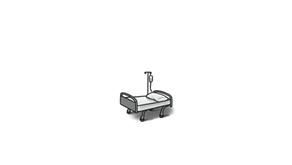Private Profits, Public Misery
By Joshua Yan 2/12/2025
The shooting of UnitedHealthcare CEO Brian Thomson and the nationwide manhunt that followed reminded Americans that their system only condemns murder lacking a revenue stream to accompany it. Per the Associated Press, nearly 80% of Americans, regardless of political orientation, express concern about access to healthcare, a figure that is not without reason. Being driven by private companies, American healthcare centers itself around generating profit, leaving medicine’s true priority—saving lives—on the sidelines.

Insurers, drugmakers and hospitals all contribute to healthcare’s inaccessibility. Insurance companies take any means necessary to avoid covering medical costs, and before the Affordable Care Act (ACA) would sometimes outright deny coverage for expensive conditions. Pharma companies, who have monopolies on numerous drugs, overstate their prices and focus their resources on extending patents in order to retain those monopolies instead of researching new treatments. Hospitals create a nationwide maldistribution of medical personnel through a career pipeline that places the majority of doctors in urban areas, making healthcare less accessible and more expensive for individual patients, especially in rural areas.
As a result, individuals in the U.S. face ridiculously high costs for their medical needs, with even something as simple as cholesterol medication costing upwards of $600 a month. Those who choose to pay for lifesaving procedures can easily find themselves financially crippled, causing more than a fourth of Americans to skip treatments entirely, according to USAFacts. While ignoring health maladies is never a good idea, a system that forces its citizens to choose between putting food on the table and living to retirement age is inherently flawed. For some Americans, the question is not whether they would like to live, but what affliction they would like to die from.
“I disagree with Mangione’s methods, but the anger he raised against the healthcare system has raised great awareness and shown big healthcare companies that the people are fed up with their practices. As citizens, we should take advantage of the spotlight Mangione shone on our healthcare system’s flaws to actively push for change, whether that be through protesting or voting for reform,” Sophomore Zack Ogle said.
In the last decade, the percentage of Americans who believe healthcare to be a government responsibility has grown from 42% to 62%, according to a Gallup poll. And while the government has taken some action to reflect this—namely the ACA, which increased health insurance coverage to 94% of U.S. citizens, and which 62% of Americans now favor (according to KFF)—the system is nowhere near perfect.
“The root of this issue is the dependence on private companies. If possible, the government should imitate other first world countries and move towards universal healthcare. To pay for this, we can redirect money from overfunded parts of the military-industrial complex, which receives far more money than it needs,” Senior Brian Zhou said.
Healthcare in Europe is government-run, leading to drastically lower costs. Data from 2022 Eurostat and Statista surveys show a healthcare expenditure per inhabitant of less than $4,000 in the E.U., compared to nearly $13,000 in the U.S.. With respect to accessibility and cost, Americans are objectively worse off—but given that the U.S. is one of the wealthiest nations in the world by GDP per capita, the government has no excuse.
It took the deaths of millions of Americans and the public execution of a healthcare CEO to unite the American people against the injustice of their system. This opportunity for change is built upon mountains of graves and debt. Now, more than ever, it is time to act.
About the Contributors

Joshua Yan
Writer
Joshua Yan is a Senior at Leland High School. This is his second year as a staff writer for the school newspaper. He likes playing piano, playing games with friends, and pen spinning.

Jane Hong
Artist
Jane Hong is a artist and a page editor. She enjoys trying out new art styles and this is her third year in journalism. Some of her hobbies include watching kdrama with her family, dancing, and painting. She also likes eating good food.

















Comments